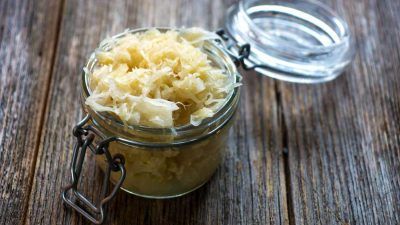Kimchi

Fermenting process
Fermenting was developed as a means of preserving vegetables for winter months when fresh produce was scarce. It is a natural preservation process in which bacteria use the carbohydrates in vegetables to produce lactic acid. The acid is responsible for the sour taste and preserves the veggies. The final product usually has to be kept in a cool place to prolong its shelf-life.
No special bacteria are needed for fermenting as the process uses bacteria naturally present on the vegetables. When you cover vegetables with water you cut off their oxygen supply and that’s when the bacteria start converting carbohydrates into acid, suppressing the growth of other microbes that could otherwise cause spoilage. These bacteria also produce vitamin K and some B vitamins, increasing the nutritional value of the food.
When you eat fermented foods you also eat the lactic acid bacteria, which join with those bacteria that already live in your colon and help you to digest food – far better than taking probiotics! Fermented foods help to lower inflammation in the gut by restoring balance. And there’s another benefit – because fermented veggies are essentially pre-digested by the bacteria, it is easier for your body to absorb their nutrients.
Kimchi
Usually made from salted Chinese cabbage (Chinese leaf), kimchi is a sharp-tasting fermented Korean speciality. It usually has other ingredients added, such as radishes, carrots, onions, cucumbers or other vegetables and is flavoured with garlic, chilli, ginger and salt. There are hundreds of kimchi varieties and each is a little different. Traditional recipes include the use of salty seafood-based condiments (jeotgal) or fish sauce so always check the ingredients.
The nutritional benefits of kimchi stem from the vegetables and bacteria so the absence of fishy ingredients in plant-based kimchis removes none of the benefits. On the contrary, it’s better for you because the consumption of salted fish and seafood condiments has been linked to stomach cancer.
There are benefits galore to kimchi! It is an excellent source of beta carotene, used by your body to make vitamin A, and it’s rich in vitamins C and K – all vital to health but harder to come by in winter when local seasonal produce is minimal. Kimchi can also contribute nicely to your calcium and iron intake – no wonder Koreans eat it with almost every meal!
Kimchi the infection fighter!
Kimchi (and sauerkraut as well) can be effective at helping to combat the Helicobacter pylori infection in the stomach – a bacterial infection that increases your risk of stomach ulcers and cancer and tends to be very stubborn. Bacteria from fermented foods help to control these nasty bacteria and support any medical treatments.
If you have high blood pressure bear in mind that kimchi is high in salt so it’s best to eat it in smaller amounts.






